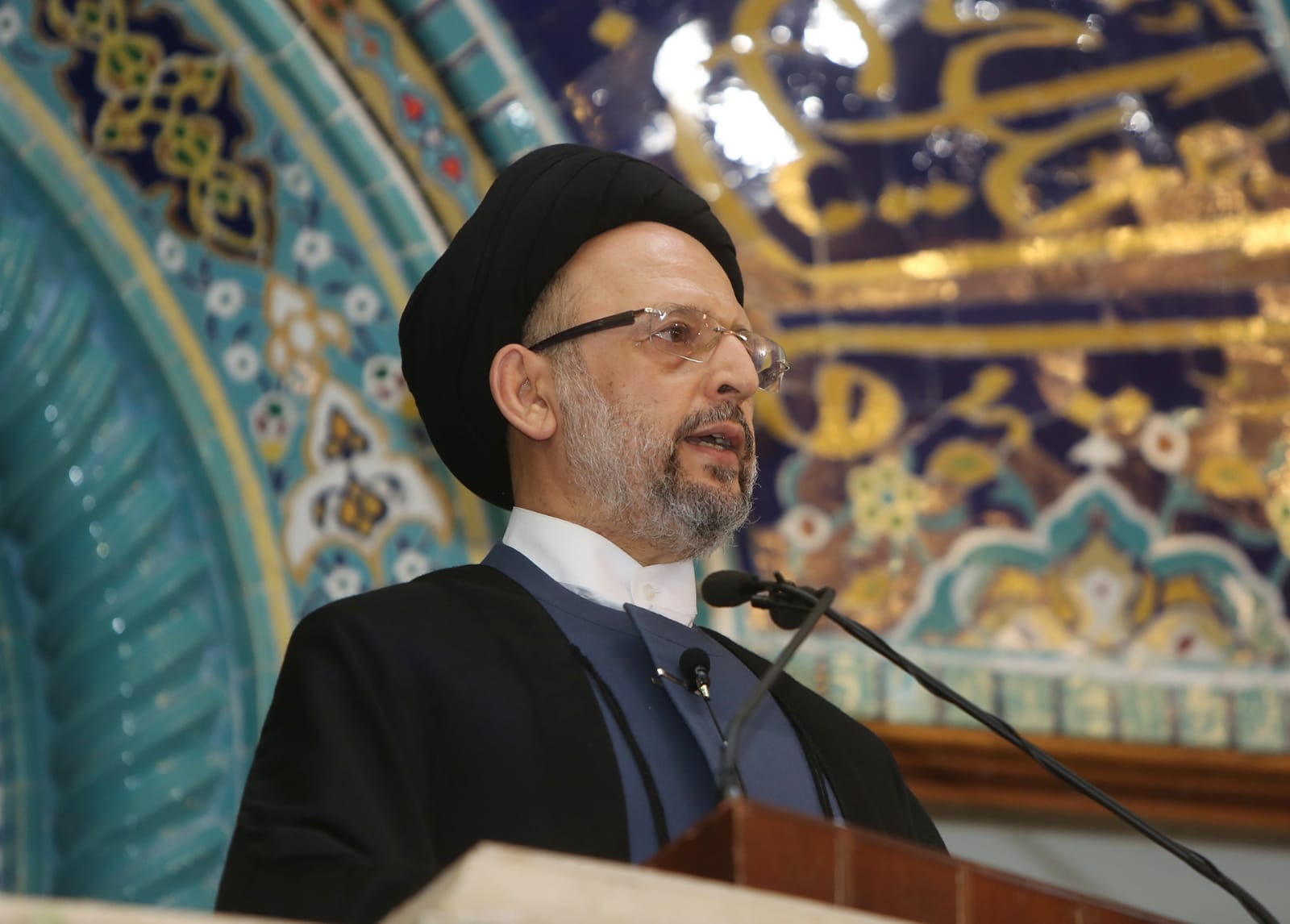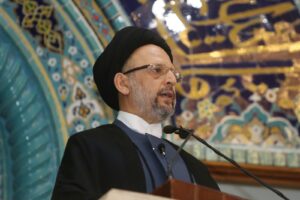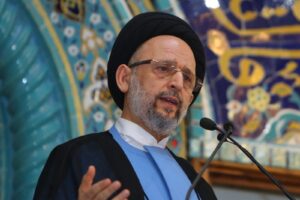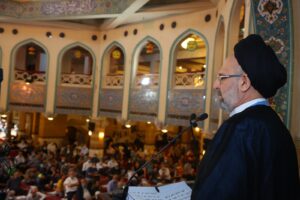Imam Zain al-Abidin (a.s.): From the Pains of Karbala to a life of missionary Jihad
.
In the name of Allah, the Compassionate, the Merciful
His Eminence, Sayyed Ali Fadlallah, delivered the two Friday prayer sermons at the Imamain Al-Hassanain Mosque; Muharram 23, 1447H/July 23, 2025. Several prominent religious scholars, dignitaries and hundreds of believers attended the Jumu’a prayer. Following is summary of his sermons
The first sermon
Imam Zain al-Abidin (a.s.): From the Pains of Karbala to a life of missionary Jihad
Allah the Most Exalted said in His Glorious Book:
{And We made them leaders guiding by Our command, and We inspired to them the doing of good deeds, establishment of prayer, and giving of zakah; and they were worshipers of Us.}Surah Al-Anbiya [21:73]
Allah, Exalted is He, speaks in this verse about a group of His prophets (a.s.), who were not only entrusted with the mission of conveying His message to people and calling them to Him, but He also appointed them as role models, leaders, and guides for people, to take them towards the right and righteousness.
And in the same line, Allah also made the Imams of Ahl al-Bait (a.s.) leaders for people, in guiding them to what pleases Him and draws them closer to Him. For the Imamate is not a mere symbolic position or honorary title, but rather a responsibility, a burden, and a message that the Imam carries to guide people and take care of their affairs in this world and the Hereafter. And the Imams (a.s.) truly lived this Imamate with all its meanings and dimensions.
And among the most prominent of these Imams is Imam Ali bin al-Hussein (a.s.). Zain al-Abidin (a.s.), whom we commemorate his martyrdom these days.
When we remember Imam Zain al-Abidin (a.s.), we remember a heart that was filled with pain, sorrow, and sadness.
He opened his eyes to find himself in the midst of Karbala, and he was still young; just twenty-three years old. He saw with his own eyes the horrors of Karbala, and he lived its tragedy moment by moment: he saw his family members being martyred, including his uncles, brothers, cousins, and finally his father, Imam al-Hussein (a.s.), the one whose head was cut off before his very eyes.
And when the swords were silent in Karbala, and the blood dried, and the bodies were crushed by the horses, he found himself in the chains of captivity, shackled, sick, and weak, surrounded by orphaned children and captured women. He was taken from Karbala to Kufa, and from Kufa to Damascus. And in every station, he faced all kinds of humiliation, insults, and abuse.
Yes, it was a heavy burden, a heartbreaking pain, and a deep sorrow that he carried throughout his life, to the point that when he would see food or drink, he would cry, remembering how his father and family were prevented from water. And when he saw a sheep being slaughtered, he would cry, saying: “Have you given it water?” They would say yes. He would say: “But my father was slaughtered while thirsty…”
But Imam Zain al-Abidin (a.s.) did not surrender to sorrow and grief. He transformed this pain into a message and a mission. He saw that he had a responsibility toward the movement of his father, the master of martyrs, and toward Islam, and toward the people.
So, he lived the remaining years of his life — around 35 years after Karbala — working on reviving the values for which his father was martyred, and confronting the corruption, deviation, and oppression of the Umayyad rule.
He employed multiple methods to achieve that, and perhaps the most prominent of them was:
- Du‘a and Supplication:
The Imam (a.s.) filled people’s hearts with supplications that not only expressed spiritual closeness to Allah but also instilled values of awareness, justice, dignity, responsibility, and social commitment. His book Sahifa al-Sajjadiyya is an immortal treasure of knowledge, spirituality, and resistance.
- Moral and Social Reform:
The Imam (a.s.) worked on building a righteous Islamic society. He taught people good manners, emphasized caring for the poor and the weak, and insisted on the values of cooperation and mercy. He was seen carrying bread on his back at night to deliver it to the poor and needy without anyone knowing who he was.
- Cultural and Educational Work:
He (a.s.) established a wide educational movement through teaching, guiding, and answering questions. A large number of scholars graduated from his school and became a solid base that preserved the Islamic thought and authentic knowledge.
- Confronting Oppression:
The Imam (a.s.) was not silent in the face of injustice. Though he was prevented from open confrontation due to the political circumstances, he seized every opportunity to expose oppression and the truth of the Umayyad rule. The most prominent example of this is his sermon in the court of Yazid in Damascus, where he introduced himself to the people and revealed the truth about what happened in Karbala.
Imam Zain al-Abidin (a.s.) embodied the spirit of steadfastness and patience. Despite the severity of pain, the bitterness of grief, and the weight of responsibility, he did not despair, nor did he become weak or give up. Rather, he continued on the path, preserving the message and passing it on to the generations that followed.
He (a.s.) lived as a living embodiment of this Qur’anic verse:
{Peace be upon the chosen worshipers of Allah.} [Surah An-Naml: 59]
And he left this world after a life full of patience, giving, and sincerity — leaving behind a legacy that still enlightens the path of all those seeking the right and justice.
The Second Sermon
Worshipers of Allah, I advise you and advise myself with what Imam Zain al-Abidin (a.s.) used to call upon his Lord with, and what he urged us to adopt, when he would say:
“O Allah, I seek Your pardon for the wronged person who was wronged in my presence and I did not support him,
and for a good deed that was done to me and I did not thank for it,
and for someone who did me wrong and apologized to me but I did not excuse him,
and for a needy person who asked me and I did not prefer him (over myself),
and for the right of a person of right, a believer, that was upon me and I did not fulfill it,
and for a fault of a believer that became apparent to me and I did not cover it.”
Through this supplication, the Imam (a.s.) wanted to show us that it is not enough to repent to Allah, the Glorified and Exalted, or to seek His pardon for the sins we have committed, but also to repent for our shortcomings toward His worshipers — when we did not support an oppressed person though we were able to do so, or did not thank someone who did us good, or failed to fulfill the need of one who needed us, or refused the apology of someone who came seeking our pardon, or when we neglected the rights of those who have a right upon us. Only then can we truly be forgiven before Allah, the Glorified and Exalted, and become closer to Him, and thus more capable of facing the challenges.
We begin with the ongoing Israeli aggression on Lebanon, which we now witness daily — an aggression whose pace is accelerating, and which we fear may intensify further, as part of the pressure being exerted on Lebanon to push it toward the choices that this enemy wants — choices that identify with the American response that is calling on the state to set a timetable for the withdrawal of weapons from both north and south of the river (Litani), without offering any guarantees in return to meet the Lebanese demand that the Zionist entity be pressured to stop its assaults and violations of Lebanese sovereignty.
In light of these developments, we reaffirm what we have previously stated: that we call upon the Lebanese state to remain firm in its stance — that its priority should be the enemy’s full commitment to a ceasefire and cessation of aggression against Lebanon. Only after that can discussions take place regarding the issues raised, in a manner that considers the Lebanese people’s concerns and fears from this enemy, rather than merely adopting its concerns, as some would like.
At the same time, we renew our call to the Lebanese people to adopt a unified stance in support of the state’s position and not to allow the enemy to benefit from any internal disagreements to achieve its goals. And although we are fully aware of the capabilities this enemy possesses, and the significant backing it receives from America and the West, that should not lead us to surrender to its conditions in a homeland we are responsible for preserving — a homeland we must keep free and protected, just as our fathers and forefathers preserved it and sacrificed their most precious possessions for it.
In this critical stage, the Lebanese must take into account the serious events and conflicts happening around them — events that could have dire consequences on their country. They must realize the risks that may result if they remain divided and do not unite and combine their efforts to confront them.
We turn to what is happening in Syria — what we have witnessed and continue to witness in terms of dangerous clashes that have led to further bloodshed and destruction. These developments clearly indicate that those managing the affairs of this country have not done what is required of them in embracing all its components, and convincing them that they are truly committed to protecting them, and that they belong to the Syrian entire people. This led to the internal fighting we have seen, which has deepened national division and fragmentation, and which we fear may lead to an actual state of partition.
Such a state opens the door wide for the Zionist enemy to intervene — something it has long sought — under the pretext of protecting minorities. But it is clear that it does not truly seek to protect them; rather, it aims to strengthen its presence in this country, solidify its control, and eliminate any remaining points of strength. This is evident in the scale of aggression that has gone far beyond the claims of protecting the Druze community, toward fulfilling its ambitions to seize more Syrian territory.
In the face of what is happening, and out of our concern for this country, its unity, and stability, we renew our call to those managing it to review their policies in dealing with its various components, so that no sect or group feels aggrieved, excluded, or that its existence is under threat. They must take into account their concerns, fears, and specific characteristics.
At the same time, we call on all the components of the Syrian people to be fully aware of the enemy’s schemes. They have no choice but to stand together, to unite their efforts in order to build a strong state capable of protecting its citizens and confronting those who threaten them — and not to be fuel for the enemy’s partition projects, which should be clear to anyone who knows the history of this expansionist, racist enemy that seeks to control the entire region.
And we call on the Lebanese not to allow what happened in Syria to affect their relations with Syrians living in Lebanon, or to inflame divisions among local communities or disrupt security. Rather, they should take lessons from what happened in order to strengthen their resilience, their unity, and their internal harmony.
Finally, we pause at the horrifying scenes of massacres that have become the daily bread of the people of Gaza — massacres that are continuing in the West Bank as well — sparing not even those standing in line for water and food under the tight siege imposed on them.
In the face of this, we look with great pride to the Palestinian people, who are offering daily lessons in steadfastness and resilience, and in standing up to the Zionist enemy despite everything they are enduring.
We hope that the ongoing efforts will lead to a ceasefire that will end this people’s suffering and lift from them the piles of rubble from massacres — massacres the like of which no people have endured — and despite that, they have managed to stay alive with dignity, pride, and an unbreakable will.





